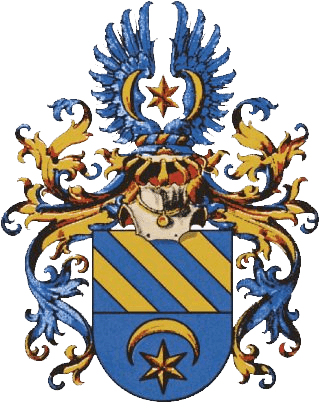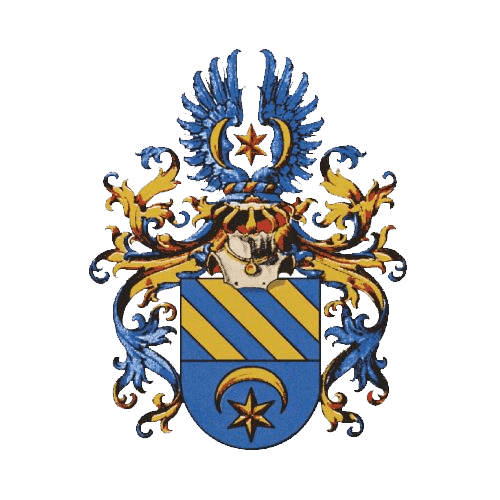HOW TO PARTICIPATE?
A citizens’ assembly involves participants in various roles:

mEMBERS OF THE
CITIZENS' PANEL
Everyday people from across Estonia, selected through a democratic lottery, who deliberate together to propose solutions on key societal issues.
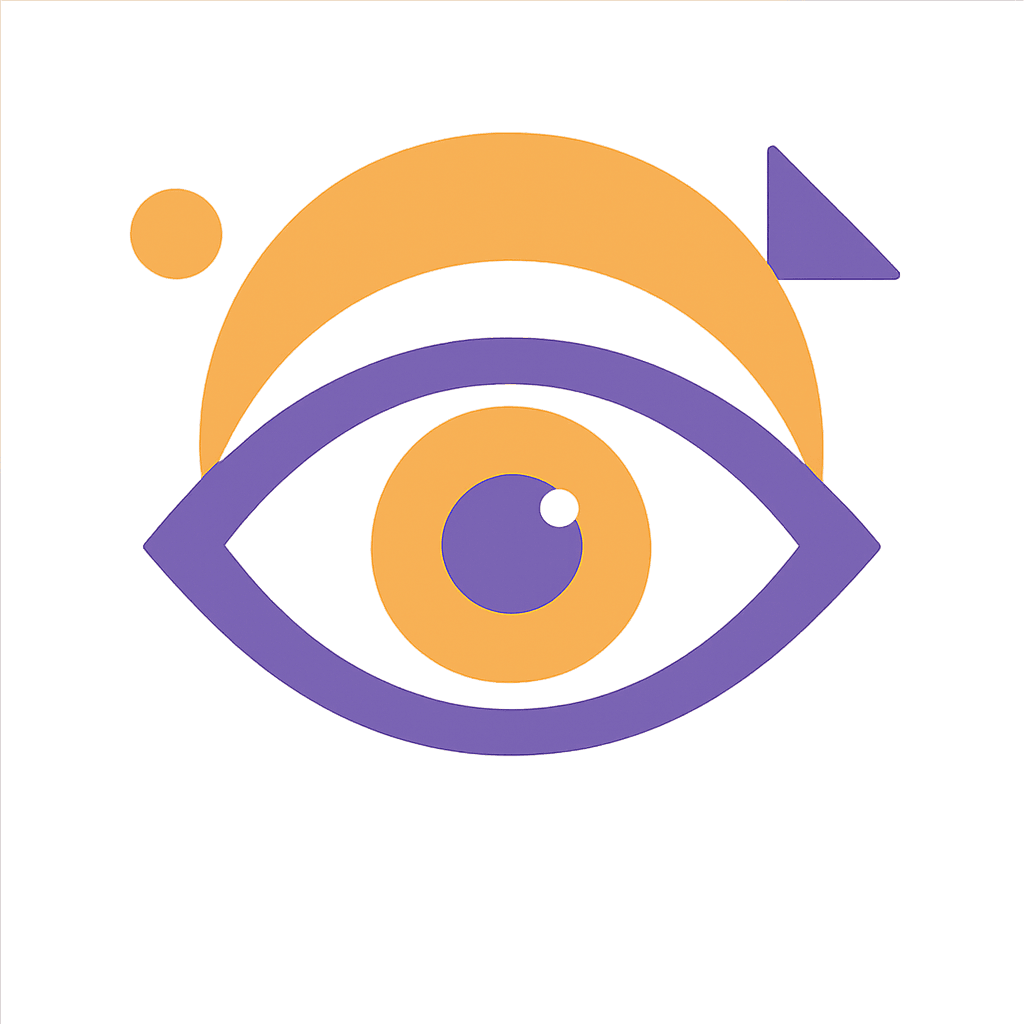
OBSERVERS
Professionals, researchers, and interested individuals who attend the assembly to learn from the process without influencing the discussions or outcomes.

EXPERTS
Topic specialists invited to present clear, evidence-based information to help participants understand the issues and make informed decisions.

Moderators
Skilled professionals who guide the overall process and group discussions, helping create a respectful, inclusive, and productive environment.
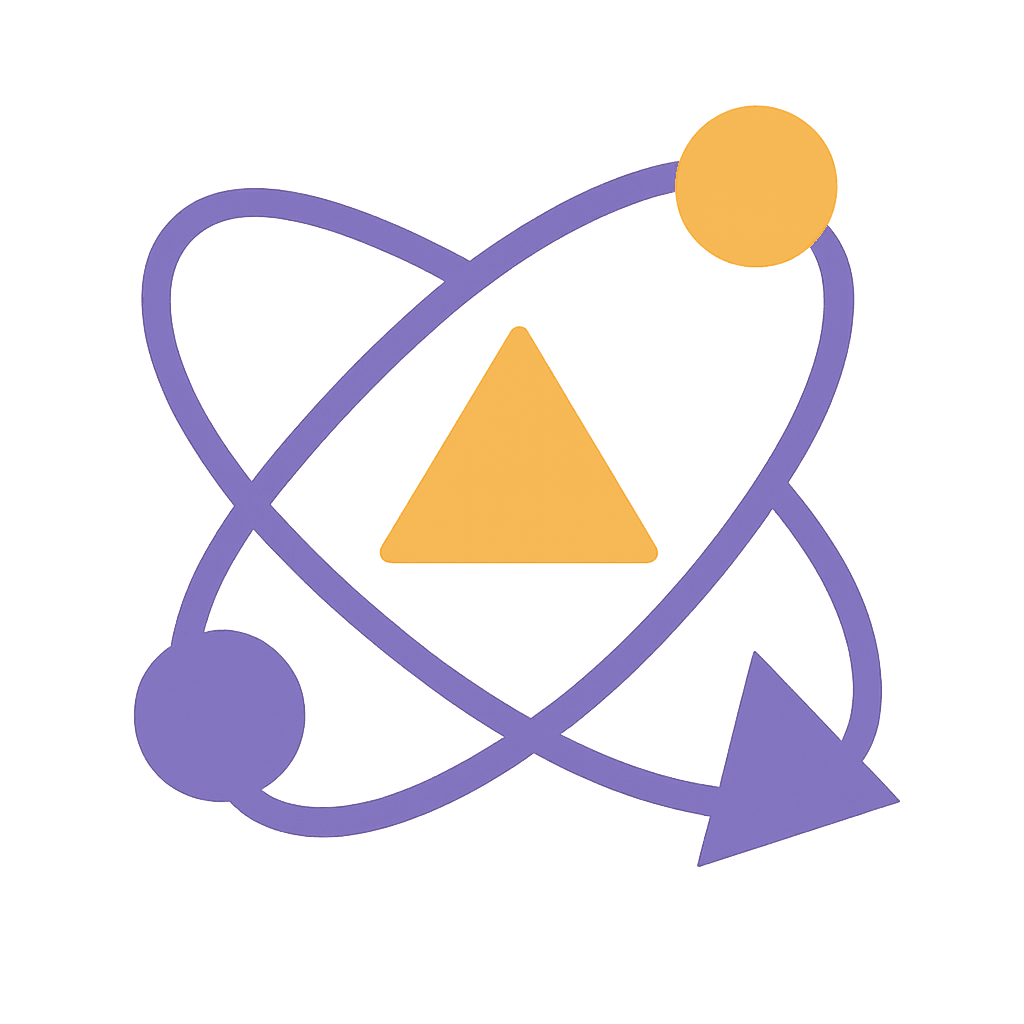
STAKEHOLDERS
Individuals and groups directly affected by or involved in the assembly’s topic, who share their perspectives, experiences, and proposed solutions.
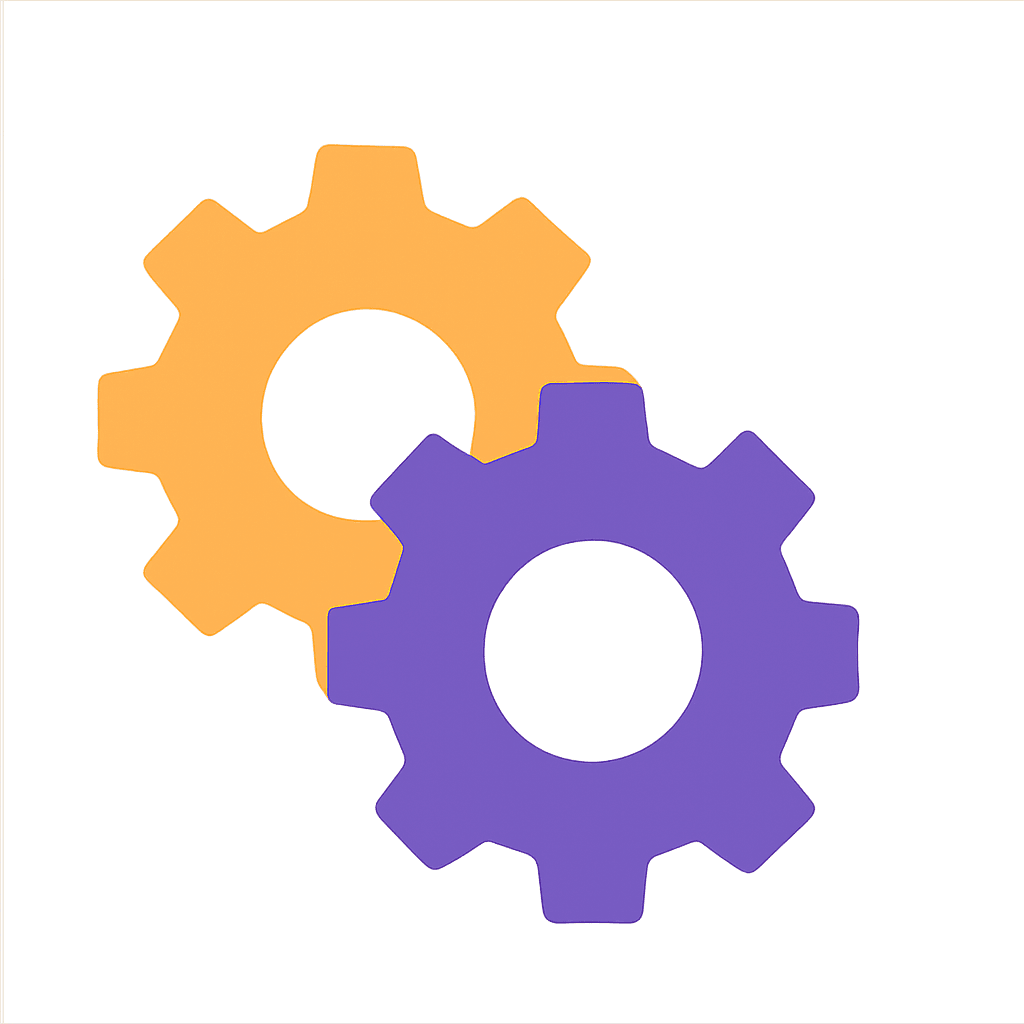
THE ORGANIZING TEAM
The team responsible for designing and facilitating the assembly process, ensuring smooth coordination, fairness, and support throughout.
Citizens’ assembly meetings are intended only for the participants listed above and are not open to the public.
If you are selected through the lottery and receive an invitation in August, you may become a member of the assembly. Otherwise, you can explore expert and stakeholder presentations, background materials prepared for the participants, and the outcomes of the deliberations on the citizens’ assembly website. After the assembly, you can support the resulting public initiatives either by helping spread the word or by adding your signature.
members of the citizens' panel
Citizens’ assembly members are those residents of Estonia who receive confirmation in mid-August that they have been selected to take part.
To receive confirmation, one must either register their interest in participating before July 20 or be selected in the initial random draw and receive a personal e-invitation to register for the assembly.
A total of 30 people from across Estonia will participate in the assembly, selected based on a representative sample. This means that the final group of 30 participants will reflect the actual population in terms of gender balance, age groups (starting from age 16), urban and rural residents, as well as people with different levels of education and socio-economic backgrounds. In this way, a kind of “mini-Estonia” is formed — a diverse group that represents the population more accurately than those who usually take part in public engagement processes.
To form this representative group of 30, around 30,000 residents of Estonia will receive an invitation via email at the end of July. Those who receive the invitation can register their interest via the link or phone number provided. Then, an algorithm will select the final 30 participants from the pool of registrants to best match the demographic profile of Estonia’s population. This approach is known as a democratic lottery.
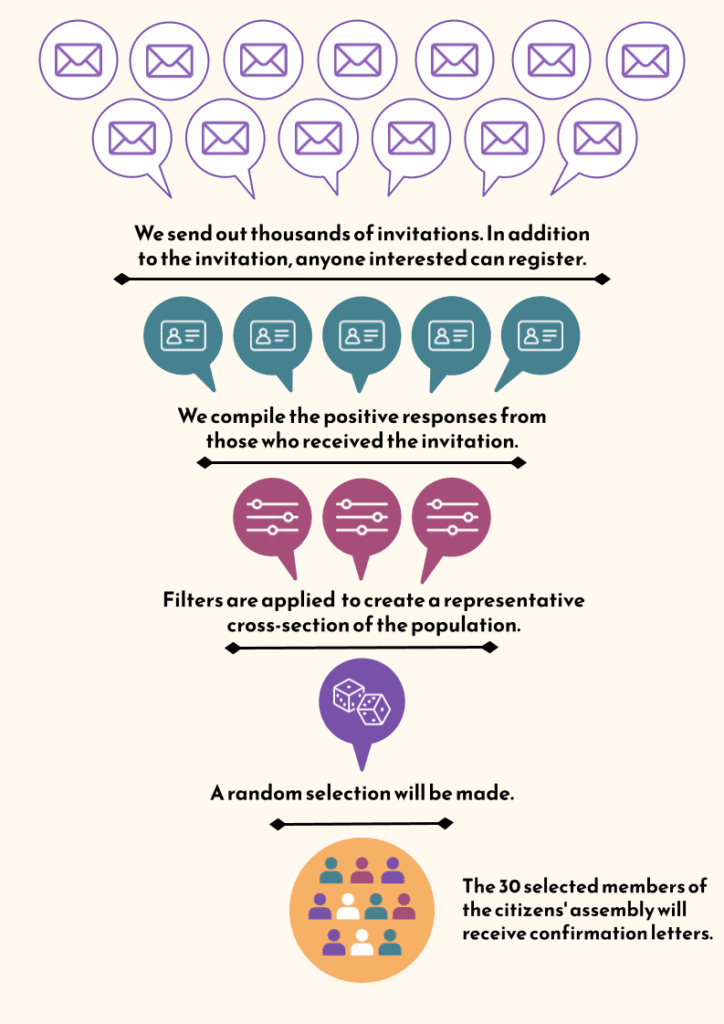
It is important to ensure the impartiality of citizens’ assembly members regarding the topics discussed.
Therefore, the following individuals are not eligible to participate as members of the assembly, as they are professionally connected to the topic or their work could be directly influenced by the outcomes of the assembly:
Politicians serving as elected representatives in local councils or the Riigikogu (Estonian Parliament);
Officials and civil servants who lead policymaking related to the assembly’s topic(s);
Individuals with business interests in the topic(s): this includes owners or board members of companies with a commercial interest in the outcomes of the assembly, as well as lobbyists working on behalf of such interests, clients, or projects during the assembly period;
Members and representatives of active interest groups, including employees of organizations participating as stakeholders in the assembly;
Members of the organizing team: including the core team, partner staff and board members, invited experts, members of the oversight group, observers, the host/facilitator, and group discussion leaders.
When registering to become a citizens’ assembly member, each person must confirm in the application form that they do not belong to any of the excluded categories. In addition, the organizing team will review the list of registrants and remove ineligible individuals before the final random selection is conducted.
As a member of the citizens’ assembly, you have the right to:
take part in developing the shared values and collaboration principles of the assembly;
participate in all citizens’ assembly meetings;
submit questions to experts and stakeholders within the designated timeframe. Citizens’ assembly members may only contact experts and stakeholders during meetings or through the organizing team;
request additional input from experts and stakeholders between meetings via the organizing team;
provide suggestions to the organizing team on how to improve the process;
participate in discussions on the assembly’s proposals. Every member has the right to freely express their views and opinions, as long as they respect others’ views and behave respectfully;
ask the organizing team to fact-check statements made during discussions. The results of fact-checking will be shared with all members, either verbally or in writing;
vote on the final proposals, provided they have attended at least half of the assembly meetings;
propose additional speakers, experts, stakeholders, or witnesses to be invited;
suggest that the organizing team hold additional meetings or sessions;
keep their identity private during the assembly process. The organizing team may only publish a member’s name with their consent, and only after the assembly has concluded.
The organizing team includes a contact person for the citizens’ assembly members, who shares information during the assembly process, answers questions, and helps resolve (technical) issues that may hinder participation.
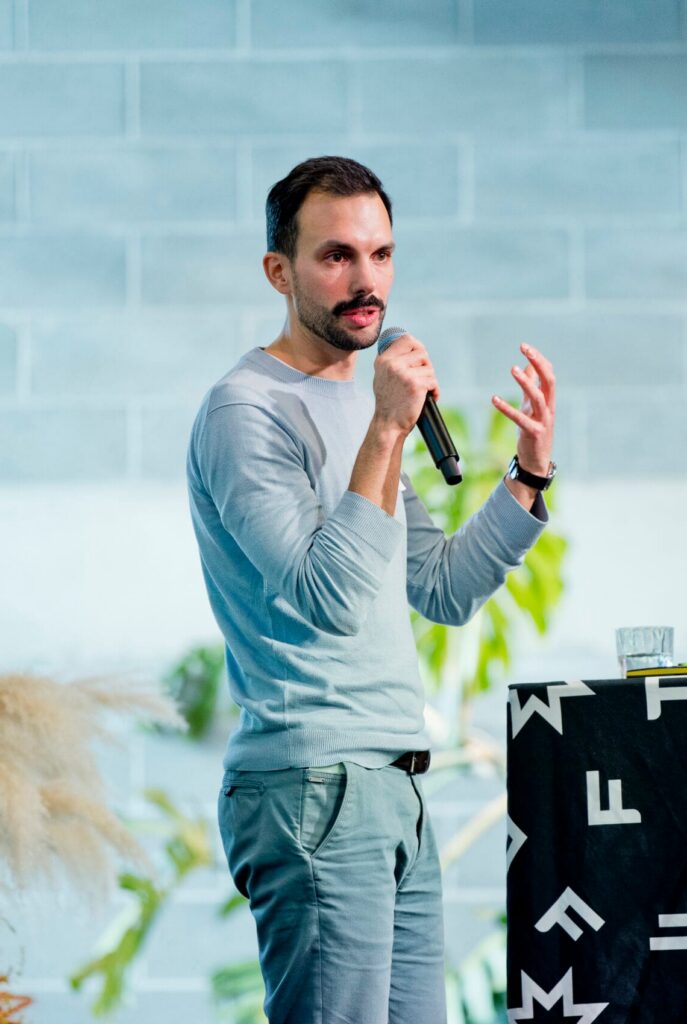
EXPERTS
The citizens’ assembly begins with a learning phase, for which experts are responsible. An expert is someone who possesses specialized knowledge of the assembly topic through their profession, education, skills, or experience. Their task is to communicate this knowledge to assembly members in a clear and understandable way.
The organizing team involves experts in preparing the Wellbeing Economy citizens’ assembly, helping to refine the overarching question and identify focus topics relevant to Estonia’s future within the Earth4All framework. In addition, experts are invited to give presentations on the second day of the assembly. The names of all contributing experts will be made public.
The list of experts is compiled and invitations are sent out by the organizing team. The selection is based on international standards, the organizing team’s thematic analysis, and the goals of the citizens’ assembly. The organizing team will send experts initial topic suggestions for their presentations, which will be finalized in cooperation with them. It is essential to rely on the expertise of these professionals to determine what kind of information citizens’ assembly members need in order to understand key concepts, connections, and impacts.
- Koostöö teiste ekspertidega lõplike alateemade ja rõhuasetuste väljatöötamisel;
- ettekande tegemine rahvakogu liikmetele 13. septembril;
- kirjalike taustamaterjalide koostamine ja ettekande põhisõnumite koondamine rahvakogu liikmetele;
- konstruktiivse ja kvaliteeti parandava tagasiside andmine rahvakogu liikmete koostatud esialgsetele ettepanekutele;
- rahvakogu liikmete seas tekkivatele täpsustavatele küsimustele vastamine.
Experts must present the content of their presentations objectively and based on evidence, using clear language and engaging delivery. The organizing team provides guidance during preparation to ensure consistent quality and synergy across all presentations.
All materials and presentations provided by the experts will be published on the citizens’ assembly website.
INVITED STAKEHOLDERS
Stakeholders are parties connected to the topic(s) of the citizens’ assembly — this includes both organized and unorganized interest groups. An interest group may be an organization, institution, or informal collective whose field of work or specific expertise relates to the assembly’s theme, or who are directly affected by the issues being discussed.
The purpose of engaging stakeholders is to complement expert knowledge with perspectives on what different groups consider essential for a future-fit good life, and what developments they wish to see — and why. Listening to stakeholders on 14 September will bring practical and real-life insights to the assembly. This allows members to weigh possible solutions more thoroughly.
For those directly impacted by the topic but not formally organized, the organizing team may invite them to the assembly as witnesses. A witness is someone who can help members better understand the topic by sharing their personal experience or perspective, or by illuminating different roles related to the issue.
The final selection of stakeholders is confirmed by the organizing team. First, a preliminary list is compiled based on background analysis. This list is then supplemented with input from the citizens’ assembly’s partners and topic-related experts. Next, the team reaches out to the stakeholders themselves — inviting them to comment on and add to the list, to ensure that the most relevant voices are included.
Since there are many topics and interest groups, and not all presentations can fit into the schedule, the organizing team will partially hand over the selection process to the citizens’ assembly members. The final list of stakeholders, designed to offer diverse and relevant input to the assembly, is approved by the organizing team and published in the schedule for 14 September on the assembly website.
Based on the confirmed list, the organizing team invites representatives of stakeholder groups to present their views, justify their positions, and propose solutions to the citizens’ assembly members. Presentations by stakeholders and witnesses must be directly related to the topic of the assembly, clearly worded, and engaging. Each stakeholder representative will have equal speaking time (approx. 10 minutes). A designated contact person from the organizing team will support stakeholders in preparing their presentations to ensure consistent quality.
Stakeholder presentations and materials submitted to the citizens’ assembly will be published on the assembly’s website. Assembly members will use the positions and solution proposals of stakeholders as input when formulating their own proposals.
If you wish to put yourself or your organization forward as a key stakeholder, please write to rahvakogud@dd.foundation.
OBSERVERS
Citizens’ assemblies are drawing increasing attention due to their growing frequency and impactful outcomes. Past assemblies have shown that the best way to understand the essence of this innovative decision-making method is to be physically present during the meetings.
For this reason, the organizing team offers the opportunity to observe the citizens’ assembly in action. Observers are primarily invited from among those professionally connected to the assembly’s topic, individuals with academic interest, or those curious about the design and facilitation of citizens’ assemblies.
Observers are welcome to attend all five working days of the assembly. The number of observers is limited. Observers are not allowed to participate in group discussions, ask questions or make comments during Q&A sessions with experts or stakeholders, or take part in voting on proposals. Communication with assembly members is permitted only with the approval of the organizing team.
To request observer status, please write to rahvakogud@dd.foundation at least one week before the relevant assembly meeting. The request should include your background and a brief explanation of your interest in the assembly.
The organizing team will ensure that the presence and number of observers do not disrupt the open and trusting atmosphere of deliberation among assembly members.
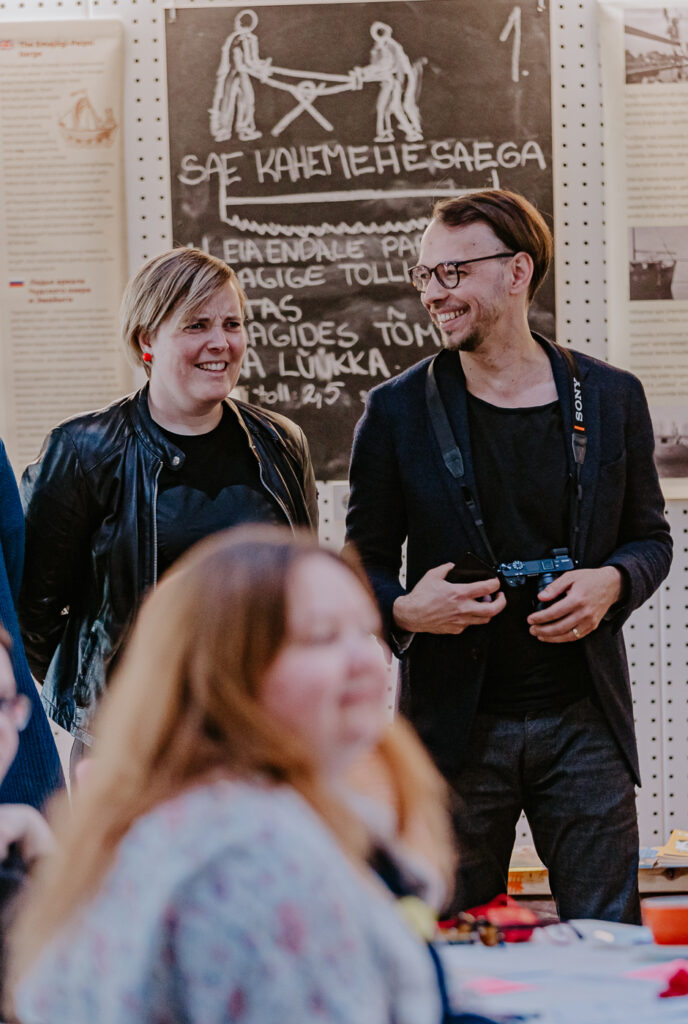
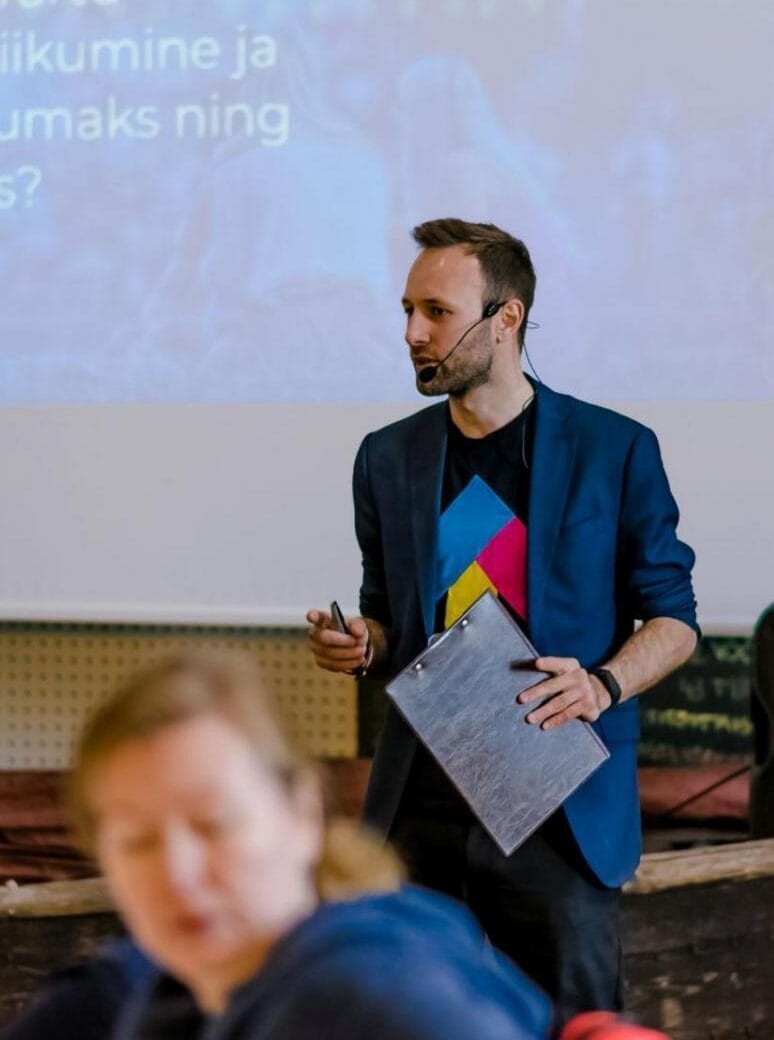
MODERATORS
The five working days of the citizens’ assembly are guided by an experienced facilitator.
The facilitator’s task is to lead the progress of the assembly meetings according to the planned schedule, work closely with the organizing team to respond to changes, and create a pleasant and welcoming atmosphere throughout the workdays. The working language of the assembly is Estonian, but the facilitator speaks Estonian, Russian, and English fluently and alternates between them as needed.
On the group discussion days, assembly members are divided into table groups, where they are supported by discussion moderators in processing information, reflecting, and drafting proposals. The role of the discussion moderator is to create a safe and supportive environment at their table, ensure that everyone has a chance to speak, and encourage participants to ask questions and express their views. Moderators help guide the group smoothly from understanding the information and reflecting on personal experiences to formulating shared positions and concrete proposals.

MENU:
CONTACT:
Email: rahvakogud@dd.foundation
Address: Raekoja plats 1, Tartu; Telliskivi 60a, Tallinn
